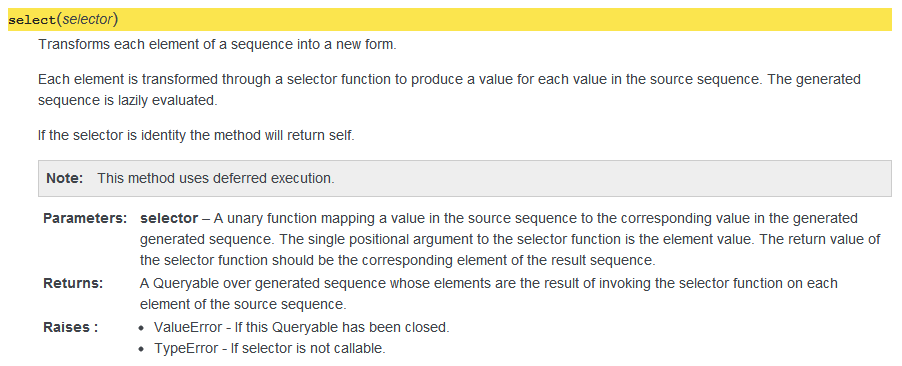cartouche
A Sphinx extension to convert help() friendly docstrings to Sphinx markup.
Welcome to cartouche
cartouche allows you to write human readable doc-strings for use with
help() which can also produce beautiful Sphinx output.
Why it's needed
Sphinx is a popular tool for documenting Python APIs which uses reStructuredText as a its lightweight markup language. Sphinx extends restructured text with semantic markup elements for documenting Python APIs but when these are used the ratio of markup to content becomes too high and readability is compromised enough that the docstring becomes unsuitable for use with standard Python introspection mechanisms like help() or IDEs.
What it does
Cartouche is a Sphinx extension which automatically converts a highly readable docstring format suitable for use with help() and IDEs to the reStructuredText hieroglyphics required by Sphinx.
Cartouche will turn this:
def select(self, selector):
'''Transforms each element of a sequence into a new form.
Each element of the source is transformed through a selector function
to produce a corresponding element in teh result sequence.
If the selector is identity the method will return self.
Note: This method uses deferred execution.
Args:
selector: A unary function mapping a value in the source sequence
to the corresponding value in the generated generated sequence.
The single positional argument to the selector function is the
element value. The return value of the selector function
should be the corresponding element of the result sequence.
Returns:
A Queryable over generated sequence whose elements are the result
of invoking the selector function on each element of the source
sequence.
Raises:
ValueError: If this Queryable has been closed.
TypeError: If selector is not callable.
'''into this,

How to get it
Use easy_install or pip to fetch it from the Python Package Index
> easy_install cartoucheor
> pip install cartouche Alternatively, download the source distribution, unzip it and run setup.py:
> cd cartouche-0.9
> python setup.py installHow to use it
Refer to the cartouche Sphinx extension in the conf.py file for your
Sphinx documentation source like this:
# Add any Sphinx extension module names here, as strings. They can be extensions
# coming with Sphinx (named 'sphinx.ext.*') or your custom ones.
extensions = ['sphinx.ext.autodoc', 'cartouche']then start writing docstrings in the form above.
Full documentation can be found here: http://cartouche.readthedocs.org/en/latest/